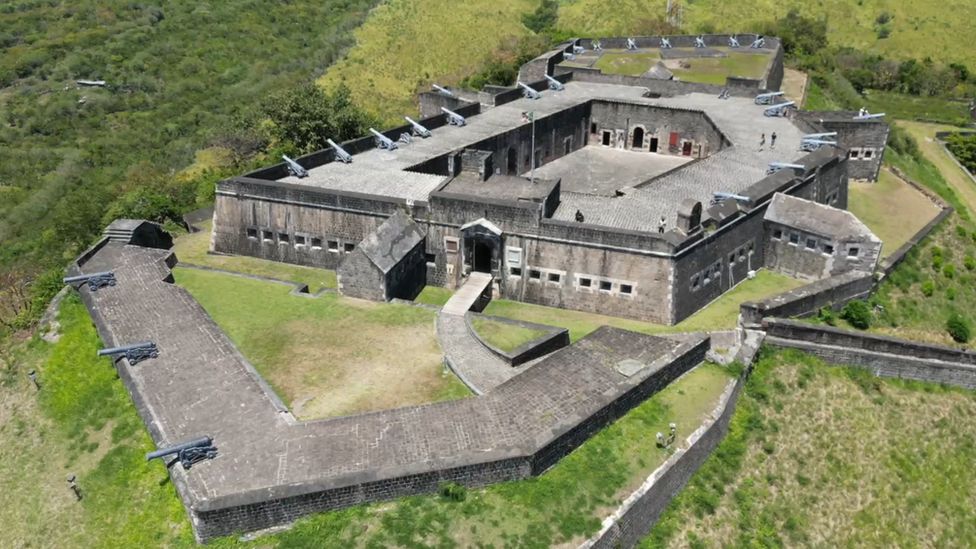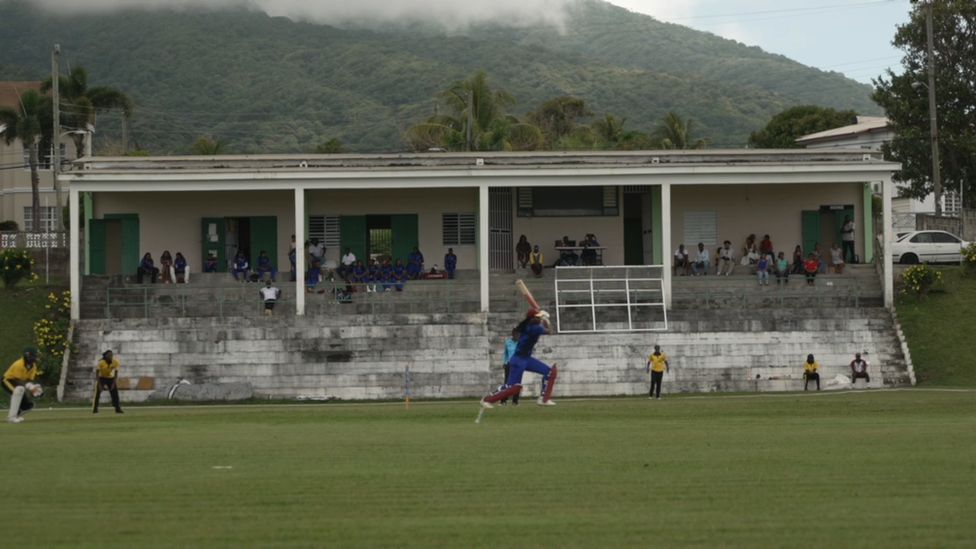Published 8 May 2023
Basseterre
Buckie Got It Media Source
By Celestina Olulode
BBC News, St Kitts and Nevis
The Prime Minister of a Caribbean nation has told the BBC his country is “not totally free” as long as King Charles III remains head of state.
Dr Terrance Drew said that a public consultation on whether St Kitts and Nevis should become a republic would begin during his leadership.
He also said he would welcome an apology from the monarchy for its historic links to the slave trade.
Buckingham Palace told the BBC the King takes slavery “profoundly seriously”.
Last month the Palace announced it was co-operating with an independent study into the relationship between the British monarchy and the transatlantic slave trade, when millions of African men, women and children were shipped to the Americas for use as slaves from the 16th to 19th Centuries.
Speaking to the BBC in the St Kitts and Nevis capital Basseterre, Dr Drew described the research as a positive move.
“I think that acknowledging that… something wrong was done, acknowledging it and apologising for it, is a step in the right direction,” he said.
After being approached for comment, Buckingham Palace said the King previously pledged to deepen his understanding of slavery’s impact. “That learning process has continued with vigour and determination since His Majesty’s Accession,” it read.
The statement also added that the monarch “has long acknowledged the discussion about constitutional arrangements”, and referred to a speech to Commonwealth leaders last year when King Charles III said: “I want to say clearly, as I have said before, that each member’s constitutional arrangement, as republic or monarchy, is purely a matter for each member country to decide.”
Last year the Dutch government issued a formal apology for its role in the slave trade. Prime Minister Mark Rutte said slavery should be recognised as “a crime against humanity”.

St Kitts and Nevis were the first Caribbean islands that English colonisers permanently settled. Locals still refer to the dual island federation as the “mother colony”.
Built upon sugar and slavery, it’s a legacy that lingers today. And if there is one place that illustrates St Kitts and Nevis’ colonial past, it’s Brimstone Hill Fortress.
Designed by the British starting in the 17th Century, it was built and maintained by enslaved Africans.
King Charles visited Brimstone Hill back in 2019. Local historian Leonard Stapleton also gave the monarch a tour of the island while he was visiting.
“It was very exciting,” Leonard told the BBC. “I still feel proud, having been tasked with that important job.”
The historian’s respect and affection for the Royal Family are clear. But he’s also aware that symbols matter.
While he said the Royal Family are “kind and genuine human beings” in person, the Crown “represents the same force that was behind the enslavement of Africans.”
Leonard Stapleton believes it is time to update some of the language of governance in St Kitts and Nevis.
“One of the things that kind of irks us as a people is when our leaders are being sworn in, we still hear them swear allegiance to the King or the Queen and their heirs and successors,” he said. “We definitely want to move to the point where we can swear allegiance to our own beliefs, our constitution.”
But he remains hopeful. “I do believe that King Charles is going to do something positive about past injustices. I am very confident. As I’ve said, I’ve met him.”
BBC
I do believe that King Charles is going to do something positive about past injustices… I’ve met himLeonard Stapleton
Historian
Both the King and the Prince of Wales have previously expressed personal sadness about slavery.
Speaking during a trip to Rwanda last year, then-Prince Charles said he could not describe “the depths of his personal sorrow” at the suffering caused by the slave trade.
Prime Minister Dr Terrance Drew also spoke to the BBC about the issue of slavery reparations – meaning some form of compensation offered to the descendants of enslaved Africans, which could include formal apologies, cash payments to individuals, or cancellation of national debt for certain countries.
“We are not just speaking about a monetary contribution, because we are not acting like victims,” he said.
“It is about real changes even within the systems that are still affecting people of African descent in negative ways.”
During then-Prince Charles’s royal visit to Barbados in 2021, Buckingham Palace said that the issue of reparations was a political matter for individual governments to address.
There is widespread support throughout the Caribbean for compensation for the descendants of enslaved Africans. A strong indication of that support was highlighted by a ten-point plan proposed by the Caricom Reparations Commission.
Caricom is an inter-governmental organisation of 15 member states including Barbados, Jamaica, the Bahamas and St Kitts and Nevis.
The main aim of the 10-point plan is to achieve reparatory justice for the descendants of enslaved Africans – including cash payments, development funding, and full, formal apologies. In 2014, it was unanimously approved by Caricom members.

At times demands for reparations have been met with unease. A common point of contention for some is whether descendants of enslaved Africans should be compensated now, given slavery ended almost 200 years ago.
But those in favour point to the fact that slave owners were compensated, while the enslaved and their descendants were not.
In 2015 British taxpayers finished paying off the debt which the government incurred to compensate British slave owners after abolition in 1833.
In recent years, royal tours to Caribbean countries have also intensified the debate around reparations. The day before the then Duke and Duchess of Cambridge arrived in the Bahamas in March 2022, the National Reparations Committee in the Bahamas released a letter calling for Britain to pay reparations for the slave trade.
Niambi Hall-Campbell Dean is the committee’s chair and a psychologist. She also welcomes the news that King Charles is supporting a study into the Royal Family’s links to the slave trade.
But she thinks that “the information that we all know is enough for the Crown to make a full and formal apology, rather than the statement of regret that we have come to be familiar with.”
“In the Bahamas, and the Caribbean, slavery ended, and colonisation came in. We went from being enslaved to [being] British citizens,” she told the BBC.
“So we had to fill in those gaps, fill in those spaces with the culture of someone that was different from us, and the culture of someone that enslaved us.”
Bahamas National Reparations Committee chair
For Niambi, reparations are about justice, saying sorry, but also about donating money – to public health programmes, national debt, and historical research.
Her views are not shared by the British Prime Minister Rishi Sunak. In April Mr Sunak refused to formally apologise for the UK’s historic role in the slave trade, telling the House of Commons, “trying to unpick our history is not the right way forward”.
But Niambi believes reparations are important for the descendants of both slave owners and enslaved Africans.
“The perpetrator requires healing,” she said. “You can’t commit a crime… and just keep it a secret, and think that secret will not affect how you live your life.”
Each time Britain’s links to the slave trade come back under the spotlight, the debate around reparations intensifies.
But reaching a general consensus of agreement regarding any next steps appears to be a long way off.





